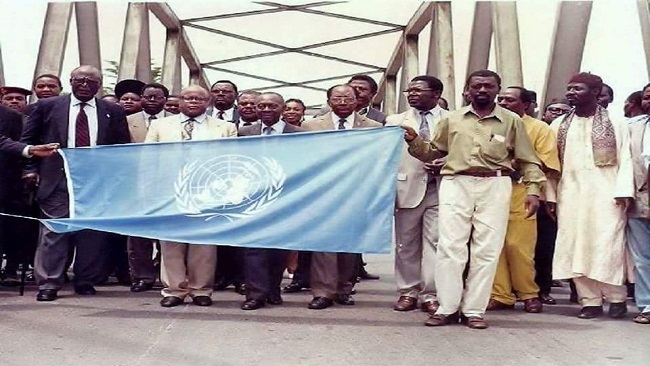Can Francophones deny these accusations levied against them that finally led to this war situation?
25 YEARS AGO: WHY FONCHA , MUNA AND 5 OTHER SOUTHERN
CAMEROONIANS WITHDREW FROM THE
CONSULTATIVE COMMITTEE ON CONSTITUTIONAL
REFORMS.
On the 4th of Dec 1994, Paul Biya signed a decree creating the Consultative Committee on Constitutional Reforms. The committee was headed by Achidi Achu to window dress it as being Controlled by an Anglophone. Of the 58 members of the committee, only 14 were Southern Cameroonians. 7 out of the 14 later withdrew from the deliberation process in committee. Among them is Pa Foncha and Muna. It should be borne in mind that the 1996 constitution of la Republic was born out of this charade.
The unbalanced representation and failure to address the Southern Cameroons question compelled
FONCHA , MUNA and Five others to withdrew. An Excerpt of what Foncha wrote in his withdrawal
letter ..
“Mr. Ahidjo publicly stated to the people of southern Cameroons during successive visits to that territory in 1960 and 1961 that unification would not mean annexation, that its modalities would be negotiated between representatives of Southern Cameroons and those of La Republique du Cameroun and that to render unification viable and useful; a flexible and federal form of the state which he qualified as unique and diverse, was envisaged…
I can state here and now that the People of southern Cameroons would never have voted in favour of
Unification if it had not been for the assurances given that the resulting union would take the form of
a federation…
The hounourable S. T. Muna and I have often been accused of having allowed this situation [i.e.
‘annexation of Southern Cameroons’] to come about. At this point in time I do not feel the necessity–nor, I suppose, does the Honourable S. T. Muna– to defend myself against these accusations, unjust though they are. What is important is that the Good Lord who, in his infinite wisdom determines the
affairs of each man and of each people, has preserved me long enough to have the opportunity of pleading before the Cameroon Nation for the correction of the wrongs which have been done, over the past three decades and more, against an unsuspecting and trusting people that I, acting in good faith and as a Cameroonian patriot, led into
What I was assured would be a union of equal partners, but which has since turned out to be an arrangement for the annexation, subjugation and domination of one of the partners by the other…
I responded to the invitation of the President of the Republic to attend this Committee in the confident expectation that the deliberations of the Committee would offer us the opportunity to correct the wrongs which I have referred above.
For nearly two years, the people of Southern Cameroons whom I led into the union with La Republique du Cameroun have, through the All Anglophone Conference- AAC (now the Southern Cameroons People’s Conference-SCPC) carefully studied, responsibly formulated, and respectfully submitted to government, substantial constitutional proposals.
These proposals are aimed at ensuring a better governance of the entire united Cameroon, while also putting an end to the annexation, subjugation and domination of one of our two territories by the other, thus restoring the spirit and intent of the union of 1961…
In any event, in the proposals that have been submitted before us, I do not see any provisions at all which go in the direction of making even a token attempt to respond to the grievances of the Southern
Cameroonian People…
Mr. Chairman,
In the final analysis, the people of Southern Cameroons never participated in the elaboration and adoption of the supposed federal constitution of 1961 which was adopted by the National Assembly of La Republique du Cameroun on September 1, 1961, that is to say, one month before the birth of the federal Republic of Cameroon. These same people never participated in drawing up the unitary constitution of 1972 which was imposed upon them in a nationwide referendum.
Bearing this in mind, I had hoped that the present constitutional reform process would provide the people of Southern Cameroons the opportunity, for the first time since independence of our respective territories and the reunification of our fatherland, to contribute effectively to the elaboration and adoption of a truly Cameroonian constitution which responds to their aspirations as well…
I feel distressed that the constitutional proposals put before this committee do not offer the opportunity for us, as a nation, to address our minds to, and resolve, the genuine and legitimate grievances of the Southern Cameroonian people in particular and the Cameroonian people in general. I feel all the more distressed that this should be happening under the chairmanship of a son of Southern Cameroons whom, I believe, is as sensitive as any one of us to the injustices which his People and their Territory have suffered in more than three decades. Today, he has been designated to preside over the completion of the process of annexation of that People and that Territory.
For this, He shall tomorrow stand accused by his People, as I stand accused today. However, whereas in 1961 the bitter experiences of Southern Cameroons lay in the future that we could not predict, in 1994 we have behind us thirty-three years worth of these experiences, with the prospect of more to come unless something is done now. In the light of these experiences, we have no reason in
1994 to repeat the mistakes of 1961”
Dr. John Ngu





